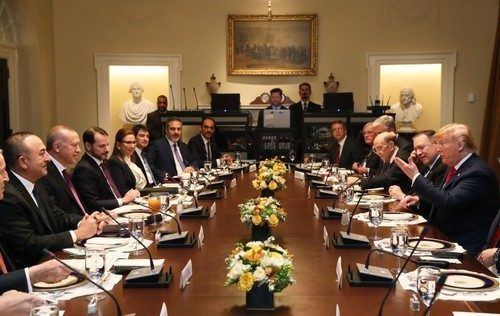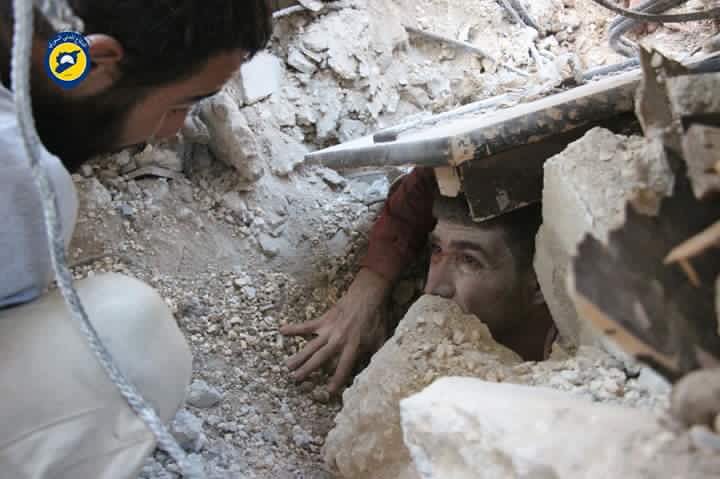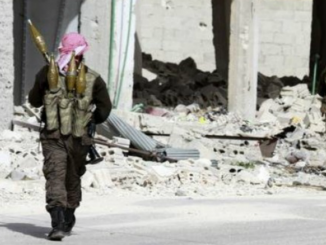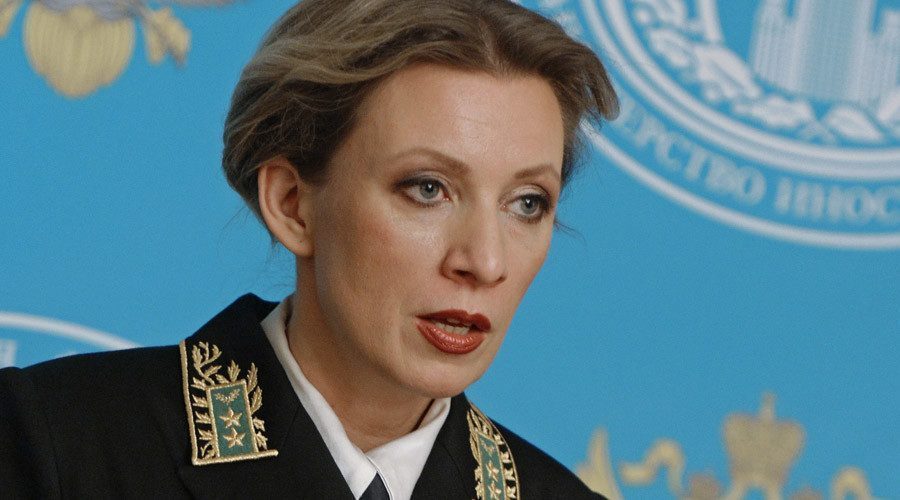
Turkish President Recep Tayyip Erdogan and U.S. President Donald Trump reportedly had “frank and very productive” talks Wednesday.
According to reports covering the Turkish President’s visit to Turkey, the bilateral talks between the two leaders reportedly far exceeded their scheduled conclusion, with both sides discussing a range of crucial matters such as Turkey’s acquisition of F-35 fighter jets, the situation in Syria and the bilateral trade volume between the two countries.
The press conference following the talks was off to a very good start with
Trump declaring that he was “big fan” of his visiting Turkish
counterpart.
“Turkey, as everyone knows, is a great NATO ally and a strategic partner
of the United States,” Trump said.
“I’m a big fan of the president.”
His comments echoed his remarks from earlier before the two presidents held a
one-one-one meeting.
“We’re great friends with President Erdogan. We understand each other and
our bilateral concerns,” he had told reporters before the talks.
After their 75-minute meeting and discussions between Turkish and U.S.
delegations, Trump again reiterated that the talks were “wonderful”,
adding: “The U.S.-Turkish alliance can be a powerful force for security
and stability, not only in the Middle East, but beyond.”
“I look forward to working with you,” Trump said, referring to Erdogan.
Then came the time to address points of contention between both sides. First up
was Ankara’s purchase of the Russian S-400 surface-to-air missile system.
“We can overcome the tests we are facing, particularly regarding the S-400
system and F-35, only through dialogue,” Erdogan told the joint press
conference.
Turkey was suspended from the U.S.-led F-35 fighter jet program after buying
the Russian system this year.
Erdogan said he told Trump that Turkey can buy U.S. Patriot missiles “if
offered the desired conditions,” in a reference to the price.
Trump said he and Erdogan have directed their senior officials to
“immediately work on resolving the S-400 issue.”
Turkey’s acceptance of the S-400, Trump said, “creates some very serious
challenges for us, and we are talking about it constantly.”
“We talked about it today. We will talk about it in the future. Hopefully,
we’ll be able to resolve that situation,” Trump said.
Regarding the expansion of the bilateral trade volume to reach $100 billion,
Trump said he thinks “we made tremendous progress on that.”
“We encourage Turkey to further open its market, and they are doing
that,” he said.
Trump also touched upon the Syrian refugee crisis. “Turkey now has 4
million refugees. Europe should undertake more responsibility regarding the
issue. I hope Europe will do what’s necessary,” he said.
Next up was the fight against terror.
“We hold the same view with President Trump regarding the readmission of
former Daesh terrorists by their countries of origin. We have underlined the
significance of the fight against terrorist groups. Turkey and the U.S. stand
side by side to eliminate Daesh terrorists and establish peace in Syria,” Erdogan
said, starting off on a positive and collaborative note.
However, he was quick to point out inconsistencies in the U.S. approach to
terrorist groups in the region.
“The People’s Protection Units (YPG)/PKK continues to launch attacks on
our country. 19 incidents of harassing fire were recorded in the last 24 hours.
Most recently, they attacked a hospital in Tal Abyad, which resulted in the
deaths of 13 civilians,” Erdogan said, underscoring Turkey’s security
concerns.
The Turkish president also expressed his disappointment in the U.S. for
inviting a terrorist into their homes.
“It’s saddening that someone whom (jailed PKK leader) Ocalan calls ‘my
adoptive son’, a PKK terrorist, was treated otherwise,” he said.
” I also handed him (Trump) the CIA document proving Ferhad Abdi Şahin
(Mazloum Abdi) is a terrorist,” he added.
Şahin is the commander-in-chief of the so-called Syrian Democratic Forces
(SDF), which is dominated by the YPG, an armed terror group that operates as
the Syrian offshoot of the PKK.
Erdogan then began talking about another terrorist, the figure behind a 2016
coup attempt that left 51 killed and 2,000 people injured.
Erdogan said he hoped the United States will deport Gulenist Terror Group (FETO)
leader Fetullah Gulen back to Turkey.
Ankara has long been demanding Gulen’s repatriation.
“I hope they will return this terrorist to us, as we return terrorists to
them when requested,” he said.
Erdogan said he provided the U.S. administration with “documents”
that proved Gulen’s links to the failed putsch.
Erdogan also criticized a House of Representatives’ resolution on Armenia,
saying it “cast a shadow on relations” with the U.S.
The Turkish president accused “terrorist sympathizers” of trying to
harm ties between the NATO allies with “disinformation.”
“I have told Mr. President that the decisions taken by the House of
Representatives on October 29 served this purpose, offended our people and
overshadowed our relations,” he told a press conference.
The House voted 405-11 on a non-binding resolution to recognize the 1915 events
as “genocide”.
Erdogan said the Armenian “event some 104 years ago under war conditions
has to be discussed by historians, not politicians,” adding that Turkey
was ready to open its state archives.



